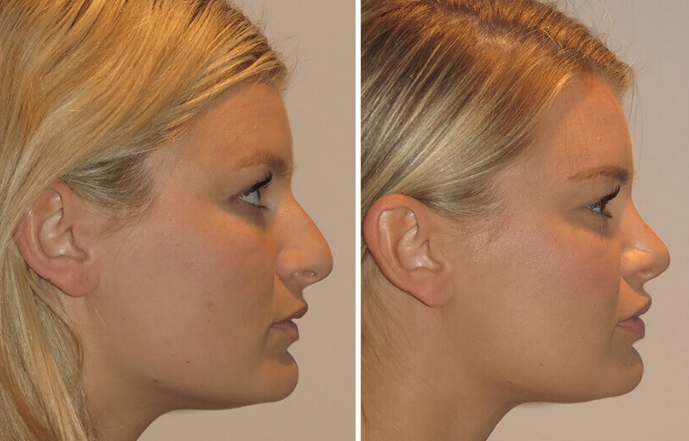Nose Implant in Portugal
Search and Compare the Best Clinics and Doctors at the Lowest Prices for Nose Implant in Portugal

Find the best clinics for Nose Implant in Portugal
No clinics available
Thailand offers the best prices Worldwide
Price: $ 192

- Home
- Portugal
WHY US?
At Medijump, we're making medical easy. You can search, compare, discuss, and book your medical all in one place. We open the door to the best medical providers worldwide, saving you time and energy along the way, and it's all for FREE, no hidden fees, and no price markups guaranteed. So what are you waiting for?

Free

Best Price

Widest Selection

Risk-Free
What you need to know about Nose Implant in Portugal

Nose implant, also known as Augmentation Rhinoplasty, is a cosmetic surgery to change the shape of the nose by placing an implant. The procedure is mostly performed to bring balance to the face since the nose is the most noticeable part of the face. The procedure can be carried out to enhance appearance or repair deformities from an injury or correct a birth defect.
What does a Nose Implant Procedure Involve?
Nose implant can be carried out under general anesthetic or local anesthetic with sedation, depending on the complexity of the surgery and your surgeon's preference. The procedure may be performed through a small incision inside the nostrils (closed rhinoplasty) or through a small external incision at the base of your nose (open rhinoplasty). After making the incision, your doctor will place the implant, which may be synthetic (Gore-Tex, Silicone, Medpor) or autologous (from other parts of your body, such as cartilage from your rib). The final step is placing the nose’s skin and tissue into its original position and stitching up the incisions.
How Long Should I Stay in Portugal for a Nose Implant Procedure?
If no complications arise, you should be able to leave the hospital on the same day. However, if general anesthesia is used during the surgery, you may need to stay overnight. After you are discharged from the hospital, expect to stay in Portugal for 10 to 14 days to attend regular follow-up checkups.
What's the Recovery Time for Nose Implant Procedures in Portugal?
You may experience swelling around your eyes, but this will gradually subside within 3 to 14 days. You should avoid strenuous activity (such as heavy lifting and intense exercise) for 3 to 6 weeks, but you may be able to return to work and some light activities in 1 to 2 weeks following the surgery. The full recovery time until your nose is completely healed is normally 6 months.
What sort of Aftercare is Required for Nose Implant Procedures in Portugal?
After your surgery, you will need to keep your head elevated to prevent aggravated swelling. Do not blow your nose and avoid extreme facial expressions for at least 10 to 14 days following the surgery. Your doctor will give you a recommended diet plan, which may include high-fiber foods such as vegetables and fruits to avoid constipation since constipation can cause strain to the surgery site.
What's the Success Rate of Nose Implant Procedures in Portugal?
Nose implant is known to have a high success rate of about 85% to 90%, particularly when performed by a certified plastic surgeon. Although the success rate is high, you need to be aware of the side effects and risks, such as bleeding, infection, difficulty breathing, permanent numbness around the nose, uneven-looking nose, pain, scarring, discoloration, septal perforation, and allergic reactions to the anesthesia.
Are there Alternatives to Nose Implant Procedures in Portugal?
If you do not want to undergo surgery but you want to change the appearance of your nose, your alternatives are fillers and Botox, which are non-invasive. Both are injected into the skin of your nose to change its shape.
What Should You Expect Before and After the Procedure
Before the nose implant, you may not like the shape, size, or the overall look of your nose, your nose may look smaller or large on your face. After a nose implant, the size of your nose can be augmented and made proportionately to fit your face, which will improve your overall appearance.
Whilst the information presented here has been accurately sourced and verified by a medical professional for its accuracy, it is still advised to consult with your doctor before pursuing a medical treatment at one of the listed medical providers
No Time?
Tell us what you're looking for and we'll reachout to the top clinics all at once
Enquire Now

Popular Procedures in Portugal
Prices Start From $404

Prices Start From $111

Prices Start From $70

Prices Start From $220

Prices Start From $1,945

Prices Start From $101

Prices Start From $101

Prices Start From $500

Recommended Medical Centers in Portugal for procedures similar to Nose Implant

- Interpreter services
- Translation service
- Religious facilities
- Medical records transfer
- Medical travel insurance
- Health insurance coordination
- TV in the room
- Safe in the room
- Phone in the room
- Private rooms for patients available

- Interpreter services
- Translation service
- Religious facilities
- Medical records transfer
- Medical travel insurance
- Health insurance coordination
- TV in the room
- Safe in the room
- Phone in the room
- Private rooms for patients available

- Interpreter services
- Translation service
- Religious facilities
- Medical records transfer
- Medical travel insurance
- Health insurance coordination
- TV in the room
- Safe in the room
- Phone in the room
- Private rooms for patients available

- Interpreter services
- Translation service
- Religious facilities
- Medical records transfer
- Medical travel insurance
- Health insurance coordination
- TV in the room
- Safe in the room
- Phone in the room
- Private rooms for patients available

- Interpreter services
- Translation service
- Religious facilities
- Medical records transfer
- Medical travel insurance
- Health insurance coordination
- TV in the room
- Safe in the room
- Phone in the room
- Private rooms for patients available

- Interpreter services
- Translation service
- Religious facilities
- Medical records transfer
- Medical travel insurance
- Health insurance coordination
- TV in the room
- Safe in the room
- Phone in the room
- Private rooms for patients available

- Interpreter services
- Translation service
- Religious facilities
- Medical records transfer
- Medical travel insurance
- Health insurance coordination
- TV in the room
- Safe in the room
- Phone in the room
- Private rooms for patients available

- Interpreter services
- Translation service
- Religious facilities
- Medical records transfer
- Medical travel insurance
- Health insurance coordination
- TV in the room
- Safe in the room
- Phone in the room
- Private rooms for patients available

- Interpreter services
- Translation service
- Religious facilities
- Medical records transfer
- Medical travel insurance
- Health insurance coordination
- TV in the room
- Safe in the room
- Phone in the room
- Private rooms for patients available
Nose Implant in and around Portugal
Introduction
Portugal is a country located in southwestern Europe. It’s one of the oldest nation-states of Europe and the world. Its territory had been continuously invaded, settled, and fought over since prehistoric times. Today, the country has become a major tourist destination, with its architecturally stunning cities, cobblestone villages, medieval castles, great food, stunning beaches, and incredible weather. Besides its beauty, Portugal is also attracting people from all around the world for its healthcare. The country offers a combination of state-of-the-art private medical centers, with spotless facilities and private rooms, a wide range of procedures, with very short waiting lists, as well as highly trained patient-oriented medical teams who are fluent in different languages. The physicians in this country have been trained by high standard medical schools, where just top and talented students are allowed to attend.
Popular Cities and Regions in Portugal
Lisbon is the capital and the largest city in Portugal. This city is filled with friendly people, history, mystique, and amazing food. Explore its many beautiful churches, listen to Fado, take a trip to the Castle of St. Jorge, see Sintra, and have some fun in one of its nightclubs. Another popular destination is Batalha, which is home to the UNESCO-listed Batalha Monastery. The monastery was build from 1386 to 1517 and is known as the greatest Gothic masterpieces in Europe. Those who want to party or soak up the sun should visit Lagos, while those who love to wander around and visit museums should visit Porto. Both of these cities are popular and fascinating.
Transport in Portugal
International tourists usually arrive at Lisbon Airport. It is a hub for low-cost airlines EasyJet and Ryanair, and it serves flights to numerous cities around the world. To get around Portugal, trains and buses are very efficient. While trains are often cheaper, buses are usually quicker. Taxis are available in almost every city and are relatively cheap.
Visas in Portugal
Since Portugal is part of the Schengen Area, citizens of 62 countries, including the US, Australia, the UAE, and Canada, are allowed to visit without a visa for up to 90 days. Citizens of most other countries are required to obtain a Schengen visa to visit the country.
Weather in Portugal
From March to May it is spring and the weather is pleasant but there will likely be some heavy rain. Summer, is from June to mid-September, can be scorching hot with temperatures rising to mid 30oC. Autumn, starts from mid-September to December and it brings colder temperatures but and an increased chance of rain. Winter can get quite cold and the days are shorter and always expect rain and storms during this season.
Additional Info
- Local Currency: The euro is the official currency. 1 EUR is equivalent to 1.08 USD.
- Money & Payments: ATMs are widely available, except in small villages. Credit cards are often accepted at midrange and high-end establishments. Tipping is usually expected at hotels and restaurants.
- Local Language: The official language is Portuguese. However, English, French, and Spanish are widely spoken in the country.
- Local Culture and Religion: Christianity is the major religion of the country. Other religions are practiced by a small portion of the population.
- Public Holidays: Portugal Day, Restoration of Independence, and Christmas Day are some of the public holidays celebrated in Portugal.
Popular Searches
- Plastic Surgery in Thailand
- Dental Implants in Thailand
- Hair Transplant in Thailand
- Breast Augmentation Thailand
- Gastric Sleeve in Thailand
- Gender Reassignment Surgery in Thailand
- Laser Hair Removal in Bangkok
- Botox in Bangkok
- Dermatology in Bangkok
- Breast Augmentation in Bangkok
- Coolsculpting in Bangkok
- Veneers in Turkey
- Hair Transplant in Turkey
- Rhinoplasty in Turkey
- Stem Cell Therapy in Mexico
- Rhinoplasty in Mexico
- Liposuction in Mexico
- Coolsculpting in Tijuana
- Rhinoplasty in Korea
- Scar Removal in Korea
- Gastric Sleeve in Turkey
- Bone Marrow Transplant in India
- Invisalign in Malaysia
- Plastic Surgery in the Dominican Republic
- Tummy Tuck in the Dominican Republic
- Plastic and Cosmetic Surgery in Poland
- Rhinoplasty in Poland
- Hair Implant in Poland
- Dental Implants in Poland
- IVF in Turkey